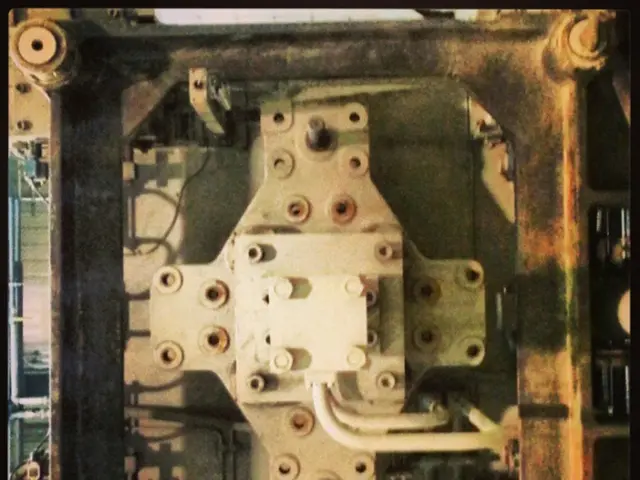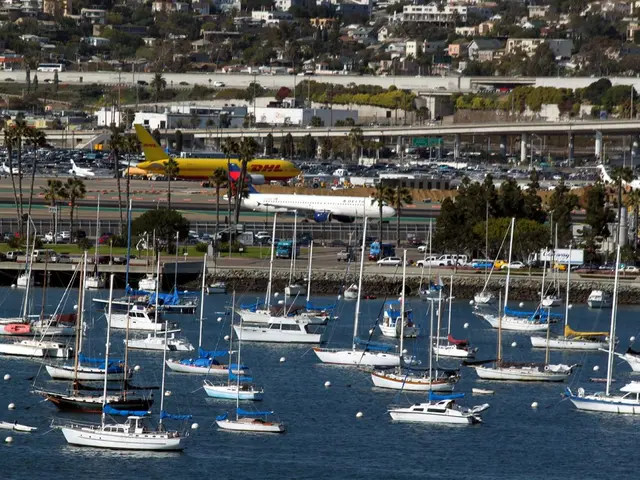Crafting a Gritty Take on Qatar Airways' Tariff Resilience
Qatar Airways devises strategies to tackle escalating tariff challenges
In the unforgiving landscape of aviation, where tariffs and trade war tiffs reign supreme, Qatar Airways stands its ground, unfazed and unbowed. The Middle Eastern airline's stockpile of aircraft spares is like a fortress, shielding it from the potential consequences of higher tariffs that might otherwise make sourcing these vital components a living nightmare.
In a raw, no-holds-barred interview, CEO Badr Al-Meer confessed, "If I try to bullshit you by claiming tariffs ain't touching us, I'd be lying through my fucking teeth. Of course, they're gonna take a bite out of our supply chain, our cargo operation." But he also emphasized that this battle-scarred industry titan will "absorb and goddamn adapt" to any changes that come their way. Passenger traffic, he asserted, remains steady enough to halt any immediate need to jack up ticket prices.
The oil-rich nation's flagship carrier has gotta balls of steel, Al-Meer revealed, tackling the shitstorm stirred up by Trump's tariffs head-on. Despite higher costs for spare parts and the possibility of tariffs on new aircraft, Qatar Airways' rep continues to rake in the dough on its US routes, with an upward trend predicted in the coming months. This hearty resilience has echoed in Emirates' recent statements, the world's largest long-haul airline also claiming no signs of a slowdown.
However, not every fucking airline is as lucky. Carriers like Virgin Atlantic have reported drops in traffic on transatlantic routes, while American Airlines has thrown in the towel and retracted its full-year earnings prognosis, citing consumer worries about the economy muddying the forecast.
To combat the potential cost spikes, Qatar Airways won't let passengers foot the bill. The airline's already saddled with a diverse fleet that spans both Boeing and Airbus aircraft, creating complications in maintenance, training, and other areas. Al-Meer hinted at a shift towards an Airbus A320-family single-aisle fleet, phasing out Boeing leased planes in the process.
The airline's been flirting with the idea of abandoning a Boeing narrowbody order that was placed during a disputes-laden period, when it got snubbed by Airbus. With Airbus back in its good books, Qatar Airways is planning a unitary narrowbody strategy, with Al-Meer pointing to its existing order of nearly 60 Airbus A321neos.
Watch out for some big-ass deals in the coming weeks, as the airline prepares to announce a large widebody purchase. This move will further cement the Middle East region as a powerhouse for both Boeing and Airbus, as airlines expand their fleets and tourism-pushing nations continue to invest billions in transforming their deserts into tourist triumphs.
Qatar Airways claims the number two spot in the region behind Emirates, boasting a long-range fleet anchored on the Boeing 777 and 787, along with Airbus A350 and older A330 aircraft. The airline's also inked a deal for Boeing's new 777X model, though the delayed aircraft won't be gracing the skies with Qatar until next year. Till then, Qatar plans to install its snazzy Q-Suite business-class cabins on its A350s rather than twiddling its thumbs waiting for the Boeing planes.
That's right, they're not waiting for the new planes to drop — they're elevating the experience on the fuckers they already got. Now that's what I call grinding through the shitstorm!
- Despite the impact of tariffs, Qatar Airways' CEO, Badr Al-Meer, asserted that the airline has the resilience to absorb and adapt to these changes.
- In the aviation industry's battleground, Qatar Airways continues to withstand higher tariffs on aircraft spare parts and potential tariffs on new aircraft, such as the Airbus A321neos.
- Confidant in its resilience, Qatar Airways plans to announce a large widebody purchase in the coming weeks, further cementing the Middle East as a powerhouse in the aerospace and finance industry.
- In an effort to combat potential cost spikes, Qatar Airways will not increase ticket prices and is considering a shift towards a unified narrowbody strategy, focusing on Airbus A320-family aircraft.








